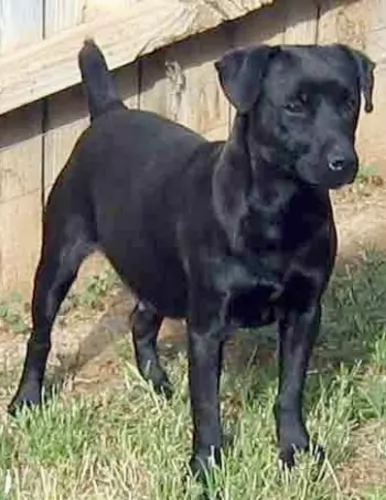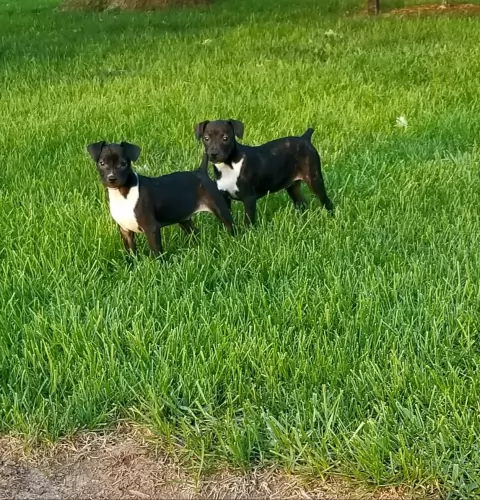 Petzlover
Petzlover Patterdale Terrier is originated from United Kingdom but Sage Koochee is originated from Afghanistan. Patterdale Terrier may grow 49 cm / 19 inches shorter than Sage Koochee. Patterdale Terrier may weigh 73 kg / 160 pounds lesser than Sage Koochee. Both Patterdale Terrier and Sage Koochee has almost same life span. Patterdale Terrier may have less litter size than Sage Koochee. Both Patterdale Terrier and Sage Koochee requires Low Maintenance.
Patterdale Terrier is originated from United Kingdom but Sage Koochee is originated from Afghanistan. Patterdale Terrier may grow 49 cm / 19 inches shorter than Sage Koochee. Patterdale Terrier may weigh 73 kg / 160 pounds lesser than Sage Koochee. Both Patterdale Terrier and Sage Koochee has almost same life span. Patterdale Terrier may have less litter size than Sage Koochee. Both Patterdale Terrier and Sage Koochee requires Low Maintenance.
 The Patterdale was developed in England,with his origins being linked to an early breeder with the name Joe Bowman.
The Patterdale was developed in England,with his origins being linked to an early breeder with the name Joe Bowman.
They were sought after for their prowess at guarding sheep from foxes. The dog was recognized by the United Kennel Club in 1995. It is believed the dog is descended from the Northern terrier breeds and can be traced far back.
 Known also as the Kuchi Dog, the Sage Koochee is a dog that was bred more for his characteristics than his looks. He was bred to be a protector and guardian and named after the Afghan Kochi people.
Known also as the Kuchi Dog, the Sage Koochee is a dog that was bred more for his characteristics than his looks. He was bred to be a protector and guardian and named after the Afghan Kochi people.
Referred to as the Kuchi or Sage Kuchi, this working dog has always helped nomads with guarding their caravans and livestock. The dog has genetic resemblance with the Central Asian Ovcharka but isn’t recognized as an official breed by any of the major kennel clubs.
 The Patterdale Terrier is a small sized dog that stands at between 25 and 40 cm in height and weighs 5 to 7kg.
The Patterdale Terrier is a small sized dog that stands at between 25 and 40 cm in height and weighs 5 to 7kg.
The coat of the dog can be smooth, broken or rough, but all coats are double and weatherproof. Colors include red, liver, black, bronze, black and tan or chocolate and sometimes brindle. The ears are floppy and medium length and the tail is also medium length and held high, curving slightly. It used to be docked and then ¼ to 1/3 of the tail was removed.
The Patterdale Terrier is small but he is bold and confident and very energetic. He will certainly need to be in a household where the family members are active, busy people. Because he is strong-willed he will benefit from training and socialization which will make him obedient and able to behave well in different situations.
 The Sage Koochee is a large molosser dog, although they do vary quite a bit in height. This is because they generally come in 3 varieties.
The Sage Koochee is a large molosser dog, although they do vary quite a bit in height. This is because they generally come in 3 varieties.
They can stand at between 58 to 89cm in height and they weigh between 38 to 80kg. This is because this dog is divided into 3 types. The coat of this dog can be short, medium or long, and colors can vary quite a bit as well.
These are moderate, seasonal shedders. Their tails are usually docked to about 1/3 of their length and their ears have been traditionally docked too. They are very territorial and won’t show any tolerance to strangers coming onto the property. He also tends to be aggressive towards other dogs.
These dogs are tough and fierce and also immensely intelligent. Such a dog would have to be trained and socialized or you would land yourself with a strong-willed, disobedient dog.
Once they’ve had training, they are friendly, obedient and affectionate towards their owners, but aren't a good choice for children. They are extremely territorial and make good watchdogs,being prepared to fiercely protect their human family.
The very nature of this dog makes it not suitable for life in the city. It would be terribly frustrated in small spaces and can become aggressive.
 Intelligent, courageous and feisty, the Patterdale Terrier is a dog that will get on well with everyone in the house. Those who are active and outdoor types will be the best kind of dog owners for this active, energetic dog.
Intelligent, courageous and feisty, the Patterdale Terrier is a dog that will get on well with everyone in the house. Those who are active and outdoor types will be the best kind of dog owners for this active, energetic dog.
The Patterdale is confident and strong willed and will do superbly well with some training and socialization. With lots of love and care, your Patterdale Terrier can make you an excellent family pet and companion.
 The Kuchi has always been vigilant with guarding livestock, and these tough dogs did the job of guardian and protector extremely well.
The Kuchi has always been vigilant with guarding livestock, and these tough dogs did the job of guardian and protector extremely well.
They’re hardy too, used to coping with extreme weather conditions, from hot deserts to freezing mountain areas. These dogs are powerful and independent and they are also dangerous.
With good training and socialization they can become loving and loyal, but they require a strong, firm owner, and don’t come as recommended if there are children in the home.
 The good news is that terriers have few health problems and they can live to a ripe age. Just like other dogs, they can also battle with some of the common dog ailments there are.
The good news is that terriers have few health problems and they can live to a ripe age. Just like other dogs, they can also battle with some of the common dog ailments there are.
Most allergens are foods, medicines or insects and exposure to the allergen can cause an over-reaction. In a dog, the most common symptom associated with allergies is itching of the skin. It can drive your pet mad as he licks and bites his skin. The symptoms of allergies can involve the respiratory system and he will have coughing and sneezing or even a discharge from the eyes.
Your Patterdales can also develop cataracts and glaucoma – two kinds of eye diseases. Glaucoma can unfortunately lead to blindness but something can be done if you recognize the signs. There are 2 main types of canine glaucoma, characterized by pressure inside the eye which can do damage to the retina and optic nerve – primary- and secondary glaucoma. Your vet will try to determine whether your pet has primary or secondary glaucoma to determine treatment.
 The Kuchi breed is healthy and doesn’t have any particular health issues. Things to look out for are bloat, skin allergies, cancer and parasites.
The Kuchi breed is healthy and doesn’t have any particular health issues. Things to look out for are bloat, skin allergies, cancer and parasites.
Parasites are a common in many dogs. Fleas and ticks are external parasites, but intestinal parasites can be a real nuisance too and endanger your dog’s health.
These parasites live within the dog’s gastrointestinal tract. They can be a host of terrible worms such as roundworm, hookworms and tapeworm among others. The parasites are usually transmitted when the dog ingests contaminated food, soil or even feces.
These parasites can cause endless problems for the dog, from weight loss to diarrhea to vomiting. You will need to get your pet to the vet.
 Your Patterdale Terrier has a lot of energy, so as a responsible dog owner, you will need to see that he is exercised properly. This will include a walk every day as well as spending time throwing balls or a frisbee for him. He is a working breed and has been used to being mentally and physically stimulated.
Your Patterdale Terrier has a lot of energy, so as a responsible dog owner, you will need to see that he is exercised properly. This will include a walk every day as well as spending time throwing balls or a frisbee for him. He is a working breed and has been used to being mentally and physically stimulated.
The Patterdale Terrier isn’t a high maintenance dog and his coat will simply require a brush twice a week. Your pet can’t tell you about any pain he is experiencing so you will need to watch his body language.
Dogs can easily pick up an ear infection and this can be very painful. When you brush your pet, check inside his ears for signs of redness and discharge and check inside his mouth to see if you can spot any rotten teeth. Bad teeth can wreak havoc on his health. Keep the nails trimmed.
If you intend feeding your pet commercially manufactured food, good and well because it is a convenient way to feed your pet, but make sure its a quality food. This will ensure your dog is getting in the right amount of vitamins and minerals.
To vary his diet just a bit, provide him with some home-made food such as boiled chicken, brown rice or pasta, and some wholesome vegetables such as carrots, spinach and sweet potato. Dogs love the simplicity and nutritional value of food like this, and they don't have to worry about getting a stomach ache from strange foods. Try and include some raw meat into the kibble from time to time as well.
Never leave your Paatterdale Terrier without a constant supply of fresh cool water.
 A nutritious commercially manufactured dog food for large working dogs will be required for this strong, energetic dog. You want to provide it with some variety, so some homemade food added into the dry kibble twice a week will ensure he is healthy and content.
A nutritious commercially manufactured dog food for large working dogs will be required for this strong, energetic dog. You want to provide it with some variety, so some homemade food added into the dry kibble twice a week will ensure he is healthy and content.
Home-made food such as boiled chicken, brown rice or pasta and spinach, sweet potatoes and carrots all boiled slowly together will delight your pet. You just chop it up and add it to the dry kibble twice a week and your pet will never look back.
For his skin and coat, you can try to add in a little bit of raw meat occasionally.Dogs thrive on simple, consistent meals like this – nothing weird and spicy so as to avoid stomach upsets.
Groom your Kuchi dog by brushing him twice a week and check simultaneously for any lumps you may find on him.
Trim his nails.
Check his eyes and make sure they are clear with no signs of discharge.
Check inside the mouth for rotten or bad teeth as he can’t tell you if one is rotten and causing him tremendous pain and discomfort.
Make sure his vaccines are up to date to avoid life threatening canine diseases.
Provide him with a nice, warm dry place to sleep.
Make sure he has access to shade and sun when he’s outdoors.
Have him or her spayed or neutered to avoid puppies